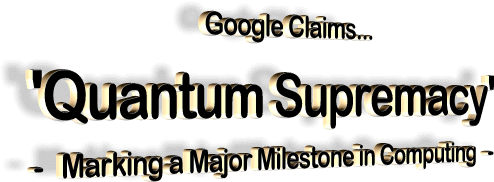|

by Robert Hackett
September
20, 2019
from
Fortune Website
Spanish summarized version
Italian summarized version

In what may be a huge milestone in computing,
Google says it has
achieved "quantum
supremacy," an experimental demonstration of the
superiority of a
quantum computer over a traditional
one.
The claim, made in a new scientific paper, is the most serious
indication yet that the promise of quantum computers - an emerging
but unproven type of machine - is becoming reality, including their
potential to solve formerly ungraspable mathematical problems.
Essentially, Google purports to have pulled off a stunt on a quantum
computer that no classical machine - not even the world's most
powerful supercomputer - can replicate.
Fortune obtained a copy of Google's paper, which was posted
to NASA.gov earlier this week before
being taken down. The
Financial Times
first reported the news (fully
published
here).
A Google spokesperson declined to confirm the authenticity of the
paper and its results. NASA did not respond immediately to a request
for comment.
A source at Google familiar with the situation suggested, however,
that NASA accidentally published the paper early,
before its team's claims could be thoroughly vetted through
scientific peer review, a process that could take anywhere from
weeks to months.
If the paper holds up under the scrutiny of the scientific
community, it will herald a watershed moment in quantum science.
Its central claim
counters doubt that some unforeseen law of nature may prevent
quantum computers from operating as hoped.
"Quantum speedup is
achievable in a real-world system and is not precluded by any
hidden physical laws," the Google researchers write.
Further, they predict
that quantum computing power will "grow at a double exponential
rate," besting even the exponential rate that defined
Moore's Law, a trend that observed
traditional computing power to double roughly every two years.
The experiment
The experiment described in the paper sampled randomly generated
numbers produced through a specialized scenario involving quantum
phenomena.
The researchers said they
determined that their quantum computer beat regular computers at the
task, which involved calculating the output of certain specialized
circuits.
"While our processor
takes about 200 seconds to sample one instance of the quantum
circuit 1 million times, a state-of-the-art supercomputer would
require approximately 10,000 years to perform the equivalent
task," the researchers said.
Google's quantum
computer, dubbed "Sycamore," contained 53-qubits, or "quantum bits,"
a measure of the machine's potential power.
The team scaled back from
a 72-qubit device, dubbed "Bristlecone,"
it had previously designed. The researchers estimate that performing
the same experiment on a Google Cloud server would take 50
trillion hours - too long to be feasible.
On the quantum processor,
it took only 30 seconds, they said.
"Quantum processors
based on superconducting qubits can now perform
computations...beyond the reach of the fastest classical
supercomputers available today," the researchers write.
"To our knowledge,
this experiment marks the first computation that can only be
performed on a quantum processor."
Outlook
Businesses are hoping the advancement of quantum computers, by tech
giants such as,
...will lead to
unprecedented scientific and technical breakthroughs in the coming
years.
They're eyeing
applications from new chemical reactions for the development of
drugs, fertilizers, and batteries, to the improvement of
optimization algorithms and mathematical modeling.
As exciting as Google's result is, other researchers caution against
overhyping it, fearing that inflated expectations of imminent
advances will lead to a popped bubble.
Dario Gil, head of IBM Research, advises against using
quantum supremacy as a metric with which to measure progress in
the field.
"The experiment and
the 'supremacy' term will be misunderstood by nearly all," he
told Fortune.
Gil described the
experiment as a highly special case "laboratory experiment" that has
"no practical applications."
He added,
"Quantum computers
will never reign 'supreme' over classical computers, but will
rather work in concert with them, since each have their unique
strengths."
Jim Clarke, Intel
Labs' director of quantum hardware, called Google's update "a
notable mile marker."
He said that,
"a commercially
viable quantum computer will require" many R&D advancements
before becoming a reality.
"While development is still at mile one of this marathon, we
strongly believe in the potential of this technology," Clarke
added.
The Google team, which
first wrote about their goal in a Nature article (Quantum
Computational Supremacy) two years ago, appears to be
more hopeful about the short-term prospects of its findings.
"As a result of these
developments, quantum computing is transitioning from a research
topic to a technology that unlocks new computational
capabilities," the researchers write.
"We are only one creative algorithm away from valuable near-term
applications."
Google Claims to Have Reached...
Quantum Supremacy
by
Madhumita Murgia and Richard Waters
September 20,
2019
from
FT Website

Researchers say
their quantum
computer
has calculated
an impossible problem
for ordinary
machines...
Google claims to have built the first quantum computer that can
carry out calculations beyond the ability of today's most powerful
supercomputers, a landmark moment that has been hotly anticipated by
researchers.
A paper by Google's researchers seen by the FT (Financial Times),
that was briefly posted this week on a NASA website before
being removed, claimed that their processor was able to perform a
calculation in three minutes and 20 seconds that would take today's
most advanced classical computer, known as Summit, approximately
10,000 years.
The researchers said this meant the "quantum supremacy",
when quantum computers carry out calculations
that had previously been impossible, had been achieved.
"This dramatic
speed-up relative to all known classical algorithms provides an
experimental realization of quantum supremacy on a computational
task and heralds the advent of a much-anticipated computing
paradigm," the authors wrote.
"To our knowledge, this experiment marks the first computation
that can only be performed on a quantum processor."
The system can perform
only a single, highly technical calculation, according to the
researchers, and the use of quantum machines to solve practical
problems is still years away...
But the Google researchers called it,
"a milestone towards
full-scale quantum computing".
They also predicted that
the power of quantum machines would expand at a "double exponential
rate", compared to the exponential rate of Moore's Law, which has
driven advances in silicon chips in the first era of computing.
While
prototypes of so-called quantum computers do
exist, developed by companies ranging from IBM to
start-ups such as
Rigetti Computing, they can only
perform the same tasks classical computers can, albeit quicker.
Quantum computers, if they can be built at scale, will harness
properties that extend beyond the limits of classical physics
to offer exponential gains in computing power.
'Change the game'
A November 2018
report by the Boston Consulting
Group (BCG)
said they could,
"change the game in
such fields as cryptography and chemistry (and thus material
science, agriculture and pharmaceuticals) not to mention
artificial intelligence and machine learning... logistics,
manufacturing, finance and energy".
Unlike the basic binary
elements of classical computers, or bits, which represent either
zeros or ones, quantum bits, or qubits, can represent both at the
same time.
By stringing together
qubits, the number of states they could represent rises
exponentially, making it possible to compute millions of
possibilities instantly.
Some researchers have warned against overhyping the quantum
supremacy, arguing that it does not suggest that quantum machines
will quickly overtake traditional computers and bring a revolution
in computing.
Led by John Martinis, an experimental physicist from the
University of California, Santa Barbara, Google first predicted it
would reach quantum supremacy by the end of 2017 (Characterizing
Quantum Supremacy in Near-Term Devices).
But the system it built,
linking together 72 qubits, proved too difficult to control.
It eventually revamped the system to create a 53-qubit design it
codenamed Sycamore. The system was given the task of proving
that a random-number generator was truly random.
Though that job has
little practical application, the Google researchers said that
"other initial uses for this computational capability" included
machine learning, materials science and chemistry.
"It's a significant
milestone, and the first time that somebody has shown that
quantum computers could outperform classical computers at all,"
said Steve Brierley, founder of quantum software start-up
Riverlane, who has worked in the field for 20 years and is an
adviser on quantum technologies to the UK government.
"It's an amazing
achievement."
Google declined to
comment...
|



